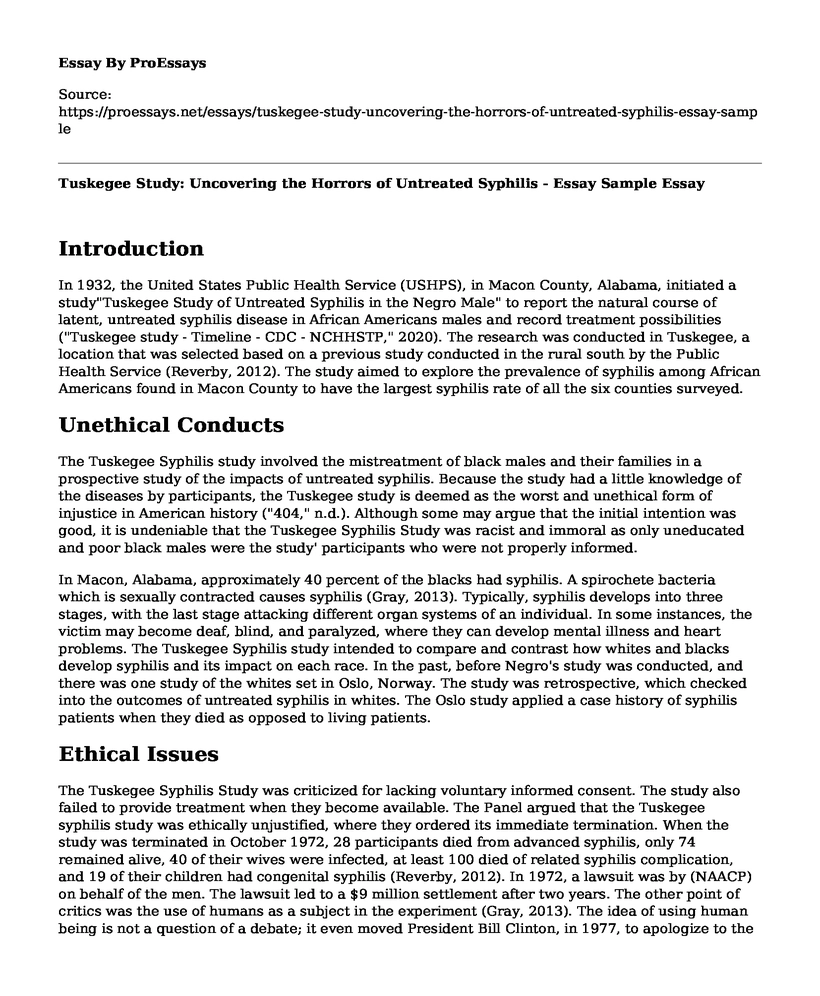Introduction
In 1932, the United States Public Health Service (USHPS), in Macon County, Alabama, initiated a study"Tuskegee Study of Untreated Syphilis in the Negro Male" to report the natural course of latent, untreated syphilis disease in African Americans males and record treatment possibilities ("Tuskegee study - Timeline - CDC - NCHHSTP," 2020). The research was conducted in Tuskegee, a location that was selected based on a previous study conducted in the rural south by the Public Health Service (Reverby, 2012). The study aimed to explore the prevalence of syphilis among African Americans found in Macon County to have the largest syphilis rate of all the six counties surveyed.
Unethical Conducts
The Tuskegee Syphilis study involved the mistreatment of black males and their families in a prospective study of the impacts of untreated syphilis. Because the study had a little knowledge of the diseases by participants, the Tuskegee study is deemed as the worst and unethical form of injustice in American history ("404," n.d.). Although some may argue that the initial intention was good, it is undeniable that the Tuskegee Syphilis Study was racist and immoral as only uneducated and poor black males were the study' participants who were not properly informed.
In Macon, Alabama, approximately 40 percent of the blacks had syphilis. A spirochete bacteria which is sexually contracted causes syphilis (Gray, 2013). Typically, syphilis develops into three stages, with the last stage attacking different organ systems of an individual. In some instances, the victim may become deaf, blind, and paralyzed, where they can develop mental illness and heart problems. The Tuskegee Syphilis study intended to compare and contrast how whites and blacks develop syphilis and its impact on each race. In the past, before Negro's study was conducted, and there was one study of the whites set in Oslo, Norway. The study was retrospective, which checked into the outcomes of untreated syphilis in whites. The Oslo study applied a case history of syphilis patients when they died as opposed to living patients.
Ethical Issues
The Tuskegee Syphilis Study was criticized for lacking voluntary informed consent. The study also failed to provide treatment when they become available. The Panel argued that the Tuskegee syphilis study was ethically unjustified, where they ordered its immediate termination. When the study was terminated in October 1972, 28 participants died from advanced syphilis, only 74 remained alive, 40 of their wives were infected, at least 100 died of related syphilis complication, and 19 of their children had congenital syphilis (Reverby, 2012). In 1972, a lawsuit was by (NAACP) on behalf of the men. The lawsuit led to a $9 million settlement after two years. The other point of critics was the use of humans as a subject in the experiment (Gray, 2013). The idea of using human being is not a question of a debate; it even moved President Bill Clinton, in 1977, to apologize to the men and members of their families. Every experiment has a limit to which it can be implemented on humans like social experiments and trials for drugs. All experiments have moral principles that guide the research to determine what is right or wrong. The Tuskegee syphilis study was not governed by utilitarianism and deontology philosophical principles (Gray, 2013). Every study needs to balance the benefit and risk of the subject in the research. The study also did not have enough money for the treatment of syphilis.
References
404. (n.d.). Tuskegee University. https://www.tuskegee.edu/about_us/centers_of_excellence/bioethics_center/about_the_usphs_syphilis_study.aspx
Gray, F. D. (2013). The Tuskegee syphilis study: An insiders' account of the shocking medical experiment conducted by government doctors against African American men. NewSouth Books.
Reverby, S. M. (2012). Tuskegee's truths: Rethinking the Tuskegee syphilis study. UNC Press Books.
Tuskegee study - Timeline - CDC - NCHHSTP. (2020, March 2). Centers for Disease Control and Prevention. https://www.cdc.gov/tuskegee/timeline.htm
Cite this page
Tuskegee Study: Uncovering the Horrors of Untreated Syphilis - Essay Sample. (2023, Aug 12). Retrieved from https://proessays.net/essays/tuskegee-study-uncovering-the-horrors-of-untreated-syphilis-essay-sample
If you are the original author of this essay and no longer wish to have it published on the ProEssays website, please click below to request its removal:
- Research Proposal on Cholera Disease
- Research Paper on Pathophysiology of Schizophrenia
- Research Paper on Sport Medicine Issues: Examining the Impact of Sport Injuries on Athletes
- Essay Sample on Achieving Healthy Sleep: Strategies from National Sleep Organizations
- Essay Example on Four IOM Reports Messages: Significance for Nursing
- Free Essay Sample on Life in the Time of Stress: How to Cope with the Pandemic
- Free Essay Example on Social Engineering and how it applies to Coronavirus Pandemic







